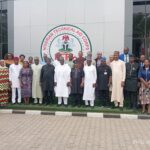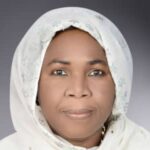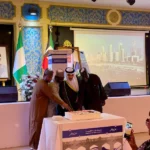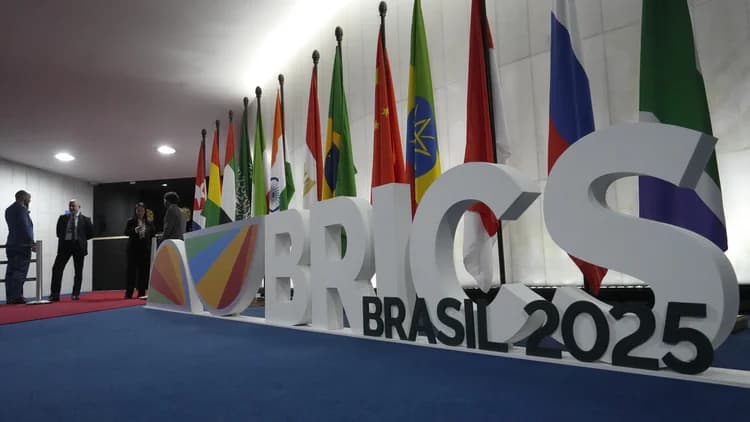By Busayo Onijala
Expansion of BRICS highlights its strengthened representation and burgeoning global appeal.
It also signals that a structural shift in the global economic dynamics is quietly underway.
An economist, Alexander Odonkor, made the assertion ahead of the 17th BRICS Summit in Rio de Janeiro, Brazil, on July 6 and July 7.
Odonkor is a member of the African Finance and Economic Association and Commentator for China Global Television Network.
The 17th BRICS Summit has the theme: “Strengthening Global South Cooperation for More Inclusive and Sustainable Governance”.
It will host an expanded grouping of 11 members and 10 partner countries, marking a significant milestone in the history of BRICS.
The News Agency of Nigeria (NAN) reports that BRICS is an inter-governmental organisation originally composed of four members – Brazil, Russia, India and China.
South Africa joined in 2011.
From 2024 to 2025, it admitted six new members – Ethiopia, Egypt, Iran, Indonesia, Saudi Arabia and the United Arab Emirates, becoming BRICS+.
During the Kazan Summit in Russia in 2024, its leaders approved the establishment of a BRICS partner country category.
One of its objectives is strengthening political, economic and social cooperation among its members while increasing the influence of Global South countries in international governance.
Nigeria became a partner country earlier in 2025, joining Bolivia, Belarus, Cuba, Kazakhstan, Malaysia, Thailand, Uganda, Uzbekistan and Vietnam.
Nigeria will make its debut as a partner country at the Brazil summit with President Bola Tinubu participating in a plenary and delivering an address on the country’s ongoing reforms aimed to reposition it for global competitiveness.
NAN also reports that Tinubu is one of the four African presidents invited to the summit.
The others are presidents of South Africa, Egypt and Ethiopia.
For Nigeria and the wider African continent, the expanded BRICS offers new opportunities for trade, investment and development cooperation amid shifting global economic dynamics.
According to Odonkor, the 11 member-countries of BRICS represent more than 40 per cent of the world’s population, 40 per cent of global oil production and exports, and 40 per cent of global trade.
He said for the participating countries, BRICS expansion means a larger market, additional resources, including energy, and huge potential for investment, as the group would seek to deepen cooperation among Global South countries.
“For example, in the area of international trade, a powerful driver of economic development and poverty reduction, cooperation between BRICS members and other developing countries has significantly advanced South-South trade.
“Despite the absence of formal trade agreements, BRICS has expanded intra-group trade and reduced dependence on traditional markets, enabling member- countries to tap into one another’s sizable market,” he said.
Referring to a 2025 policy brief by the United Nations Industrial Development Organisation, Odonkor said that, from 2002 to 2021, the total global trade of all BRICS countries grew more than sevenfolds, crossing $4 trillion from $572 billion.
He said the group had made significant progress toward forming its own network of complementary supply chains and diversifying trading relationships.
“For non-BRICS developing countries, the rapid intra-group trade between BRICS members, underpinned by its network of supply chains, presents an attractive alternative cooperation to advance the global value chain and create new growth opportunities to support development.”
The economist said that beyond trade, cooperation in the group offered an opportunity to attract more investments and collectively contribute to global growth.
He noted that in 2023, China was among the world’s top three Foreign Direct Investment (FDI) recipients, while Brazil and India each recorded notable rise in inward direct investment.
According to the economist, this makes BRICS a key driver of FDI growth, especially in emerging markets.
“Supported by expanding FDI inflows which facilitate technology transfer and capital inflows and enable member-countries to tackle development-related challenges, including climate change, BRICS has witnessed a marked expansion in its economic influence, becoming a key driver of global growth.
“In 2018, BRICS overtook the G7’s share of global GDP in terms of purchasing power parity, and by 2024, the difference further widened.
“BRICS accounted for 35 per cent, compared to the G7’s 30 per cent,” he said.
NAN reports that at the 2025 BRICS summit, discussions will focus on global health cooperation, trade, investment and finance, climate change, artificial intelligence governance, multilateral peace and security architecture, and institutional development. (NAN) (www.nannews.ng)
Edited by Ijeoma Popoola












